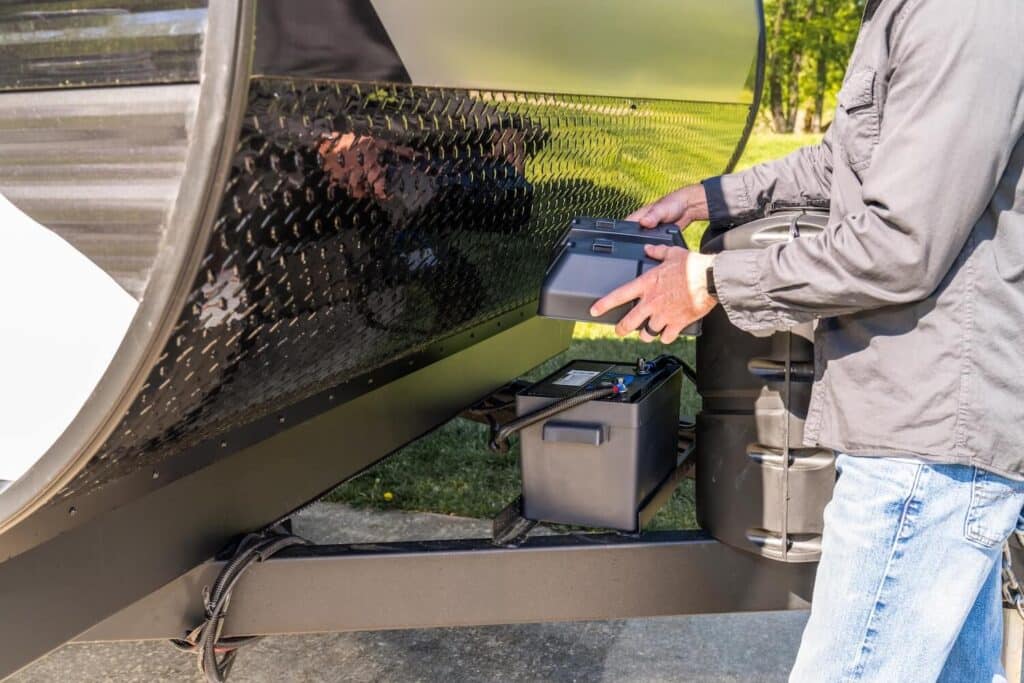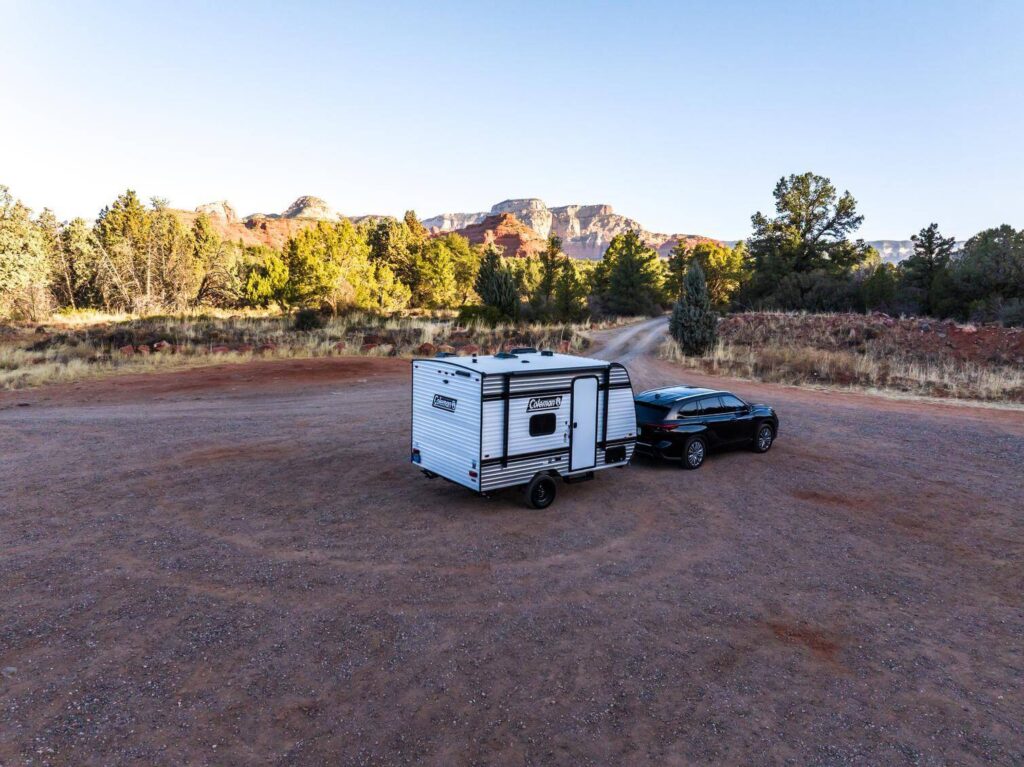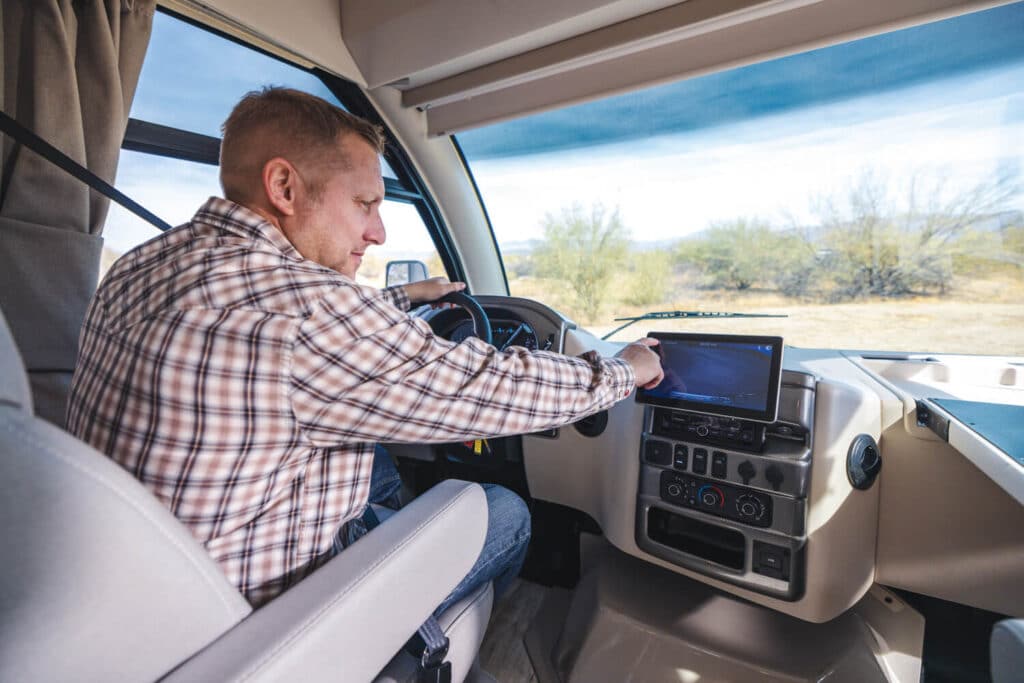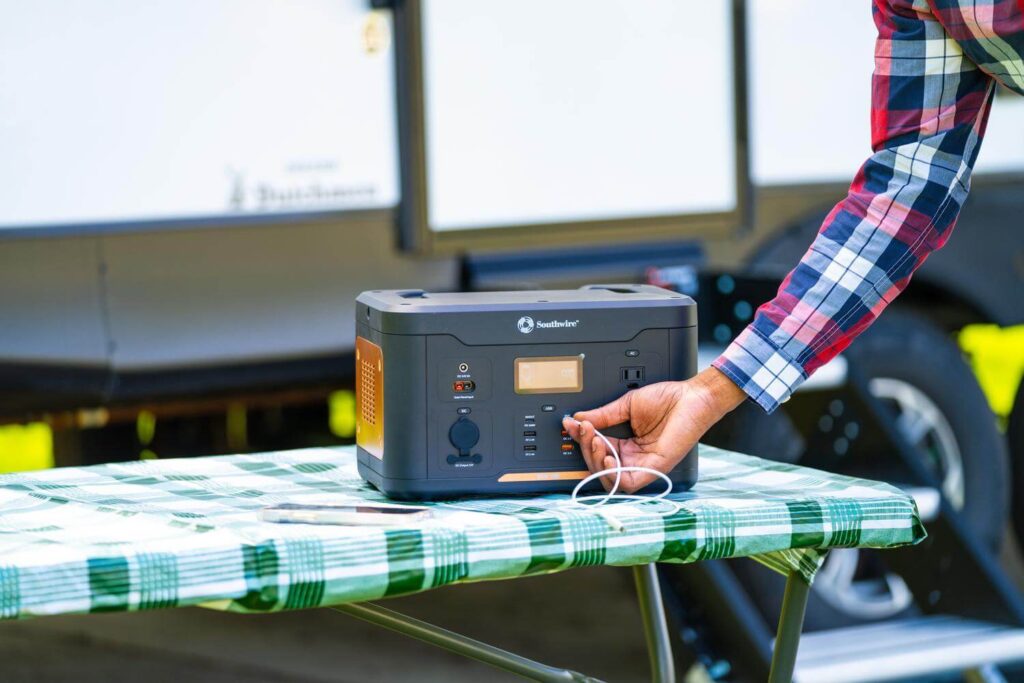A HEALTHY RV BATTERY is critical to enjoying your camper’s features. New owners must learn the different RV battery types and the maintenance to keep theirs in the best condition possible. Even then, you’ll have to replace your battery eventually. So, it’s natural to wonder, “How long do RV batteries last?”
But before we answer that question—and a few others—it’s important to note the difference between house and coach batteries. House batteries run your RV’s “living” side, powering lights, water pumps, refrigerators, and entertainment systems. Coach batteries (in motorhomes) handle the ignition and driving functions. If you own a towable RV like a travel trailer or fifth wheel, you’ll only have to worry about house batteries.
Key Takeaways
- Battery Lifespan by Type – RV house batteries last anywhere from 2 to 20 years, depending on the type: flooded lead-acid (2–7 years), AGM (3–10 years), and lithium (10–20 years). Coach (engine-starting) batteries typically last 3 to 5 years, with lithium options lasting longer.
- Single-Charge Runtime – Battery duration on one charge ranges from hours to several days, depending on appliance use. Heavy draws like inverters and residential fridges shorten runtime, while independent light sources and solar systems extend it.
- Extending Battery Life – Proper care maximizes lifespan: avoid deep discharges, keep batteries charged in storage, clean terminals, use solar or a maintainer, store in moderate climates, and perform regular load tests.
Table of Contents
ToggleHow Long Do RV House Batteries Last?

The main battery types used in RV campers are flooded, AGM, and lithium. So, let’s break down their average lifespans by type:
- Flooded (Lead Acid): 2-3 years; up to 7.
- AGM (Absorbent Glass Mat): 3-5 years, up to 10.
- Lithium: 10-15 years; up to 20.
Of course, an RV battery’s lifespan will vary based on maintenance, depth of discharge, and other environmental factors. For example, a battery that operates in excessive heat for extended periods will age more quickly.
Technician Tip: Lithium batteries must be installed indoors—they do not produce dangerous gases, so they do not have to be vented or installed outdoors like Lead/acid and AGM—where it is climate-controlled to maximize their life and to prevent damage. Operating a lithium battery below 35°F or above 140°F will quickly degrade the battery. Lead/acid and AGM batteries have a much wider acceptable temperature range and are a better choice for extreme weather use.
A battery’s life cycle also depends on how many charge/discharge cycles it can sustain in its useful life. Deep-cycle batteries come in a variety of sizes and have varying Ah ratings. Some are designated by group size (24, 27, and 31). Depending on your needs and the space available in your RV, there are several battery selection options, including:
- One 12-volt group 24 deep-cycle battery that provides 70 – 85 Ah.
- Two 12-volt group 24 batteries wired in parallel to provide 140 – 170 Ah.
- Two 6-volt batteries wired in series to provide about 100 Ah, or four 6-volt batteries can be wired in series/parallel to provide about 200 Ah.
How Long Do RV Batteries Last On One Charge?

All RV batteries can last anywhere from several hours to a few days on a single charge. This will largely depend on your appliance usage.
For example, a pair of fully charged 12-volt batteries may run only a few hours if you’re powering an inverter and a residential fridge, but they could last two or three days if you’re just using LED lights and charging phones. Adding solar panels to RV—or a generator—can greatly extend this timeframe, especially for boondockers.
When your RV isn’t plugged in, more frequent use will deplete your battery charge more quickly. However, you can extend the average time your battery lasts on one charge with more mindful appliance use and smart RV upgrades.
Here are a few tips to make your RV battery last longer, especially if you’re camping off the grid:
- Get a Power Station for Camping. This will reduce your reliance on your battery and give you another power source to charge sensitive electronics.
- Upgrade Your Solar System. Or install one if your RV isn’t currently equipped. Installing a charge controller—or RV solar panel installation—can help keep your batteries charged when camping without electrical hookups.
- Use Battery-Powered Portable Appliances. This includes headlamps, flashlights, portable fans, and anything else that makes your camping experience more comfortable while reducing your reliance on your RV’s batteries.
Technician Tip: Most solar kits aren’t designed to completely and independently power an RV off the grid. Some technicians recommend a minimum of 2,000 watts of solar before considering an entirely off-grid lifestyle, but a less robust system can still be used for supplemental battery charging.
How Long Do Coach Batteries Last In an RV?

In addition to house batteries, motorized RVs are equipped with a coach battery (sometimes called a chassis battery). This battery starts the engine, much like in a car or truck.
On average, RV coach batteries last 3 to 5 years, but their lifespan depends on battery type and care. Traditional flooded lead-acid coach batteries usually fall toward the lower end of that range, while AGM options can push closer to 5 years with proper maintenance. Lithium coach batteries are much less common, but can last 8 to 10 years or longer if installed.
Like house batteries, usage patterns, climate, and charging habits affect how long coach batteries last. RVers who frequently let their coach battery discharge fully or leave their motorhome in storage without a trickle charger will likely need a replacement sooner. However, regular upkeep makes it more likely you enjoy a reliable 3 to 5 years of performance before noticing a decline in starting power. Learn how to charge RV batteries with a battery charger.
Technician Tip: Lead/acid and AGM batteries should never be discharged below 50% because doing so will slowly reduce their lifespan. Lithium can be discharged 100% without any negative effects. Both should be stored in a charged state, but Lead/acid and AGM should be stored at 100% while lithium should be stored around 90%.
How Long Will an RV Battery Last While Boondocking?
If your RV spends most of its time plugged into an electrical source, battery maintenance will be your primary concern, instead of worrying about getting the highest Ah. On the other hand, if you like boondocking and consider RV hookups optional, you’ll want a deep-cycle battery with the highest Ah capacity you can fit in your RV.
Of course, there are ways to keep your batteries charged so they stay out longer. Running your RV generator is the simplest way, but you can also explore adding solar panels to your RV if you want extended boondocking.
How To Charge RV Batteries

The electrical system in your RV is designed to recharge the house batteries in the following ways:
- When plugged into shore power (by way of the converter)
- When connecting a towable RV to a tow vehicle (by way of the trailer wiring)
- When running the engine of your motorized RV (by way of the alternator)
- When using a solar battery charger for RV use
The good news is that there are several ways to charge your batteries naturally. The methods you can use will depend on the RV type and the solar packages that came from the manufacturer or were installed by you or a former owner.
But what if you follow the recommendations of many manufacturers and remove your battery (or batteries) when your RV is in storage?
In this case, you’ll need to use an RV battery charger to keep your batteries from discharging past their recommended level (consult your battery’s manufacturer to learn what that level is). If you remove your batteries for storage, they should be kept in a cool, dry place and charged monthly to keep them from discharging to an unhealthy level.
Tips for Extending RV Battery Life

While no RV battery lasts forever, there are proven steps you can take to maximize the lifespan of your house and coach batteries. By keeping them charged, clean, and adequately maintained, you can save money and avoid the frustration of early failure.
Here are some practical tips to extend RV battery life:
- Avoid Deep Discharges – Do not let your battery drop below 50% charge (for lead-acid batteries) or 20% (for lithium batteries). The deeper the discharge, the fewer total cycles you’ll get.
- Keep Batteries Fully Charged in Storage – Use a smart charger or trickle charger when your RV isn’t in use to prevent self-discharge and sulfation. When left on a constant charge, the electrolyte in a flooded battery will evaporate more rapidly. It should be checked every 2-4 weeks. If it is low, add distilled water only.
- Clean and Tighten Connections – Corrosion on terminals can reduce performance. Keep terminals clean, coated with anti-corrosion spray, and ensure all cables are snug.
- Store Batteries in a Moderate Climate – Extreme heat accelerates degradation, while freezing temperatures can damage a discharged battery. If possible, store batteries in a cool, dry location.
- Use Solar or a Battery Maintainer – Installing a solar panel system or using a battery maintainer keeps your batteries topped off when your RV isn’t plugged in.
- Perform Regular Load Tests – Checking battery health with a multimeter or load tester helps catch early signs of decline before failure leaves you stranded.
With these steps, many RVers can push their battery lifespan closer to the average range’s higher end, whether using lead-acid, AGM, or lithium power.
The right charging habits and maintenance will maximize your battery investment and help you avoid unexpected power loss. When it comes time to replace them, consider upgrading to AGM or lithium for longer-lasting performance and fewer frequent replacements.
Technician Tip: AGM and Lithium batteries each have a very different charge curve, and not every converter or charger is designed to properly charge every kind of battery. Anyone considering a change of battery type must first determine whether or not the charge system can be set to the new battery type.
Use these additional resources to troubleshoot or upgrade your RV’s electrical systems:
- What Are the Best Rated RV Batteries?
- RV Battery Not Charging?
- RV Battery Winter Maintenance
- GoPower Solar Options for Off-Grid Camping
- Troubleshooting RV Electrical Systems
- Ready for An RV Battery Upgrade?
Do you have questions about how long your battery should last in a camper? Let us know in the comments below.
Author
-

Tucker Ballister is our Content Strategist. He grew up RV camping in a Fleetwood Bounder with his parents and has lived and camped in two motorhomes and two travel trailers of his own. His current RV is a 2025 Forest River Campsite Ultra 26BW, which he loves taking on adventures with his wonderful partner and furry companion from their home base in Western North Carolina. Check out his adventures, gear reviews, and outdoor advice at thebackpackguide.com.
View all posts








